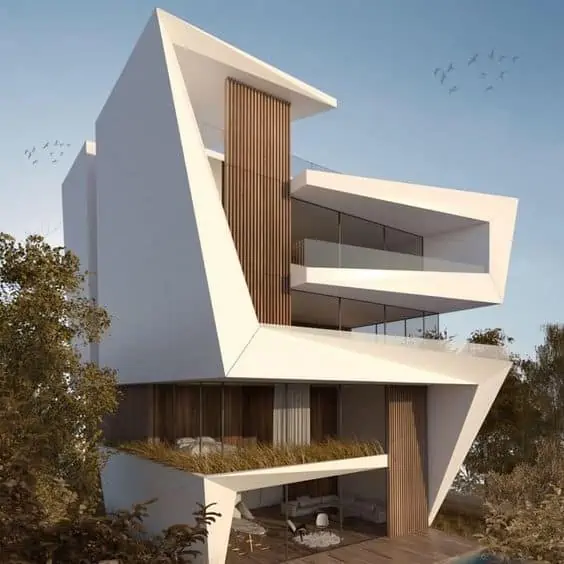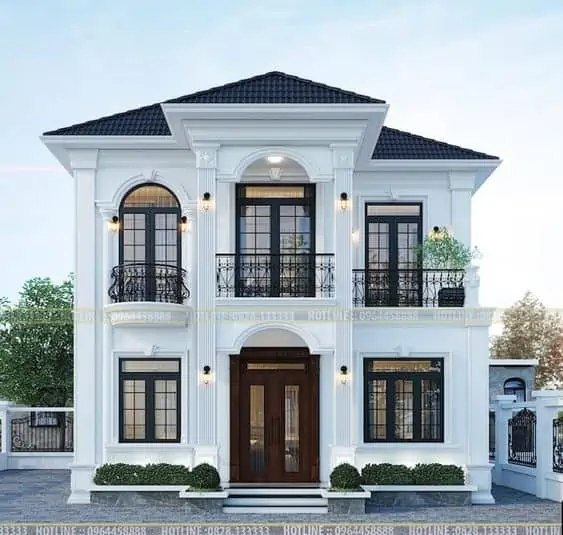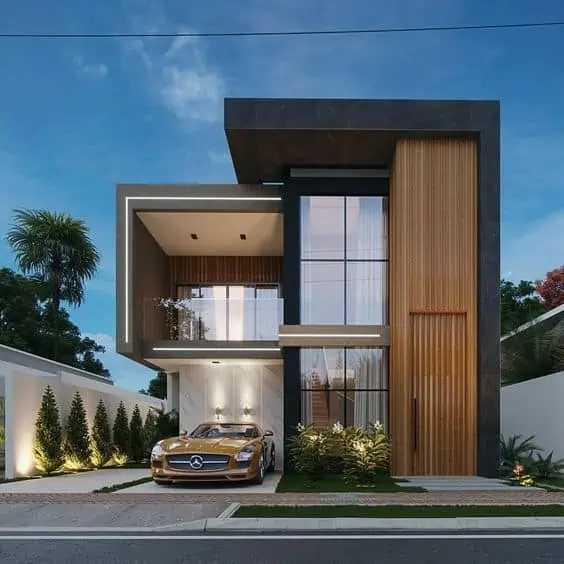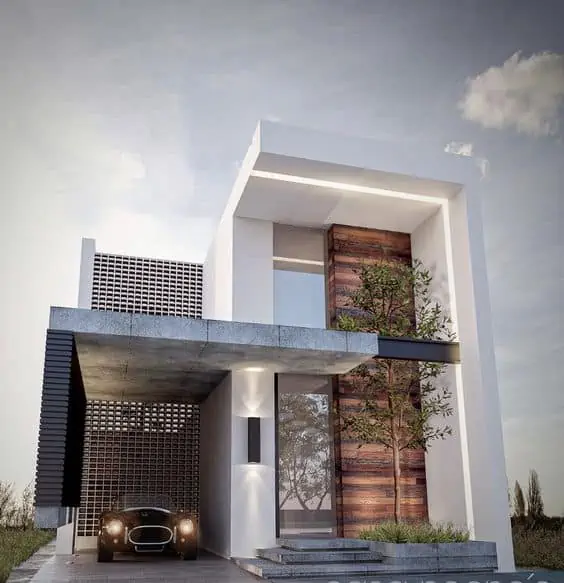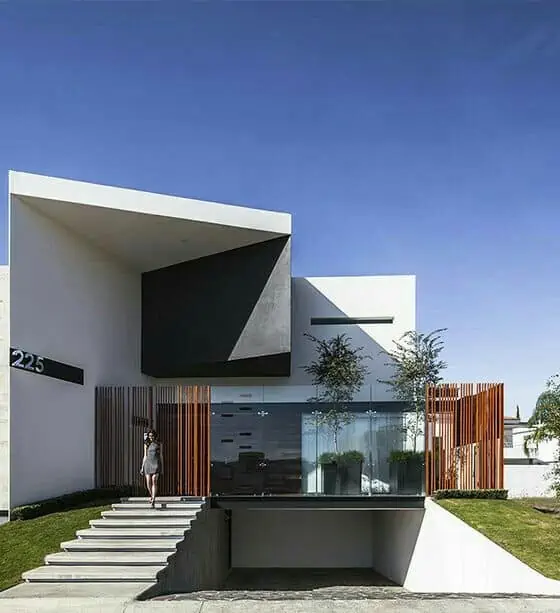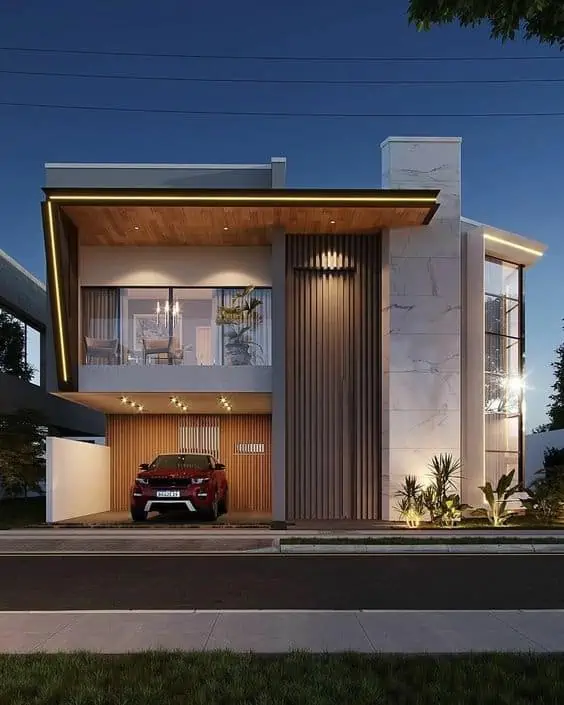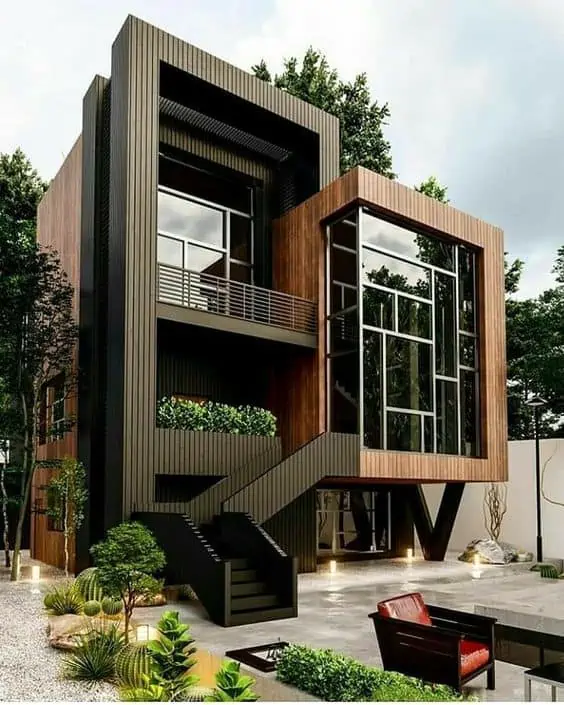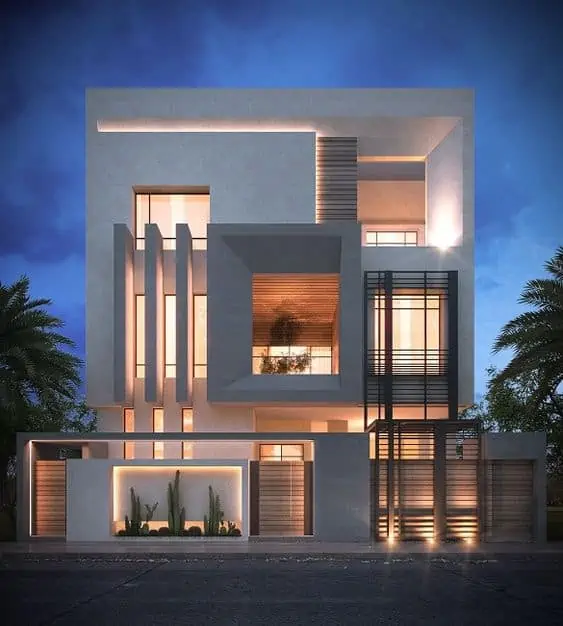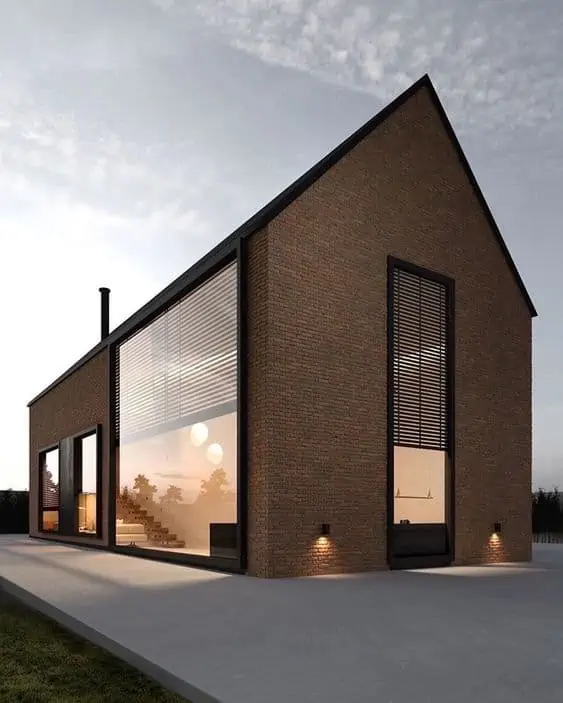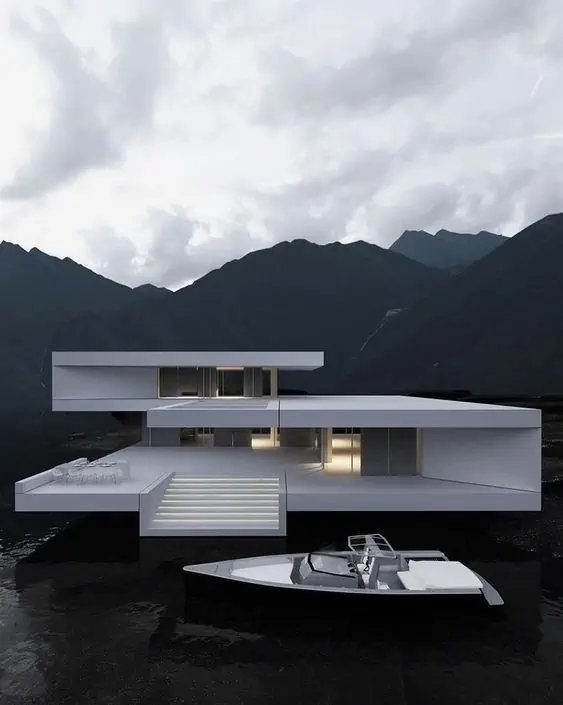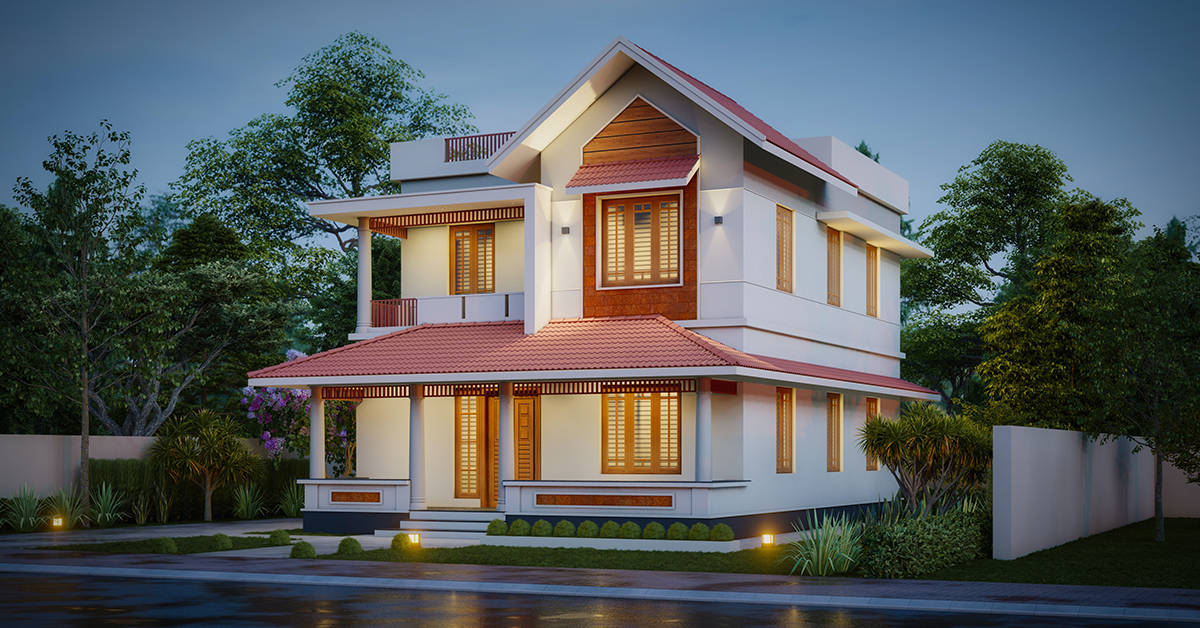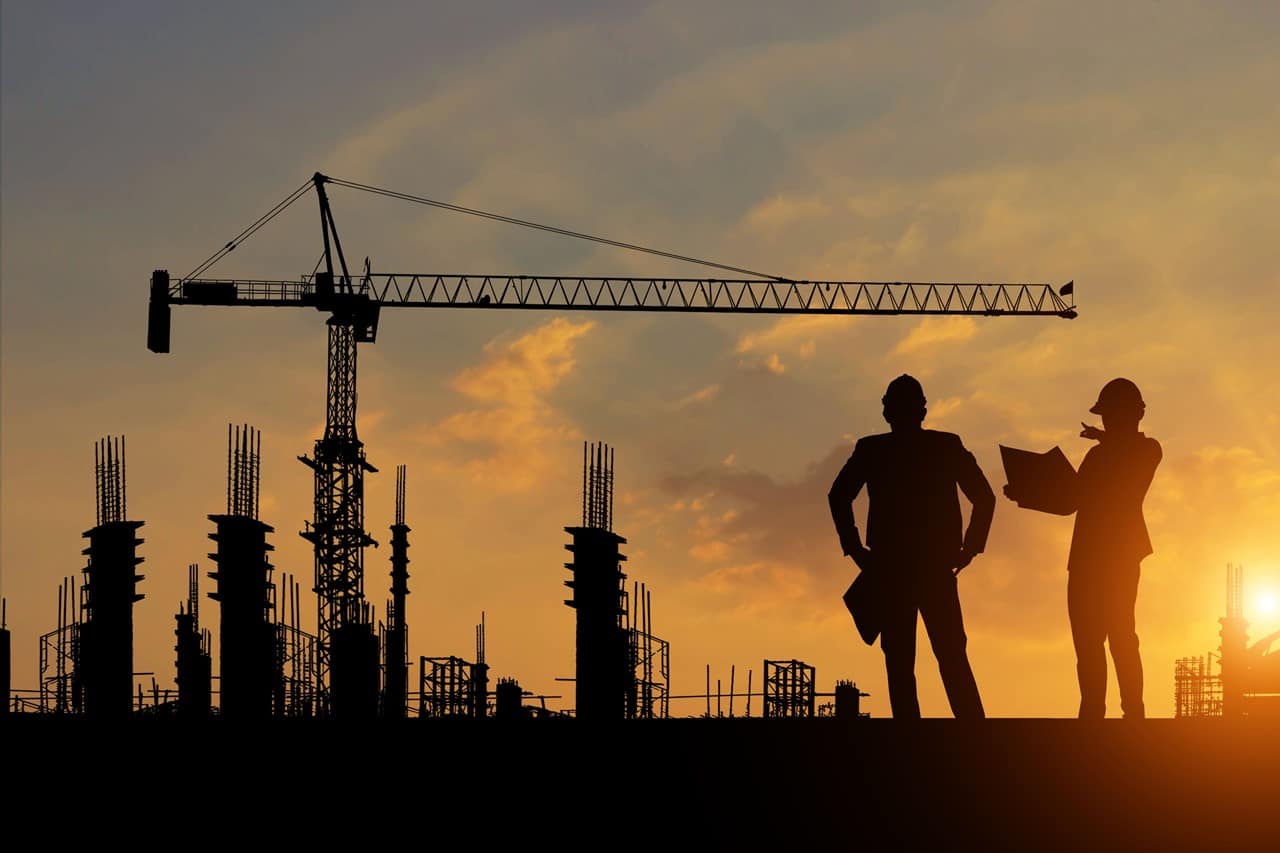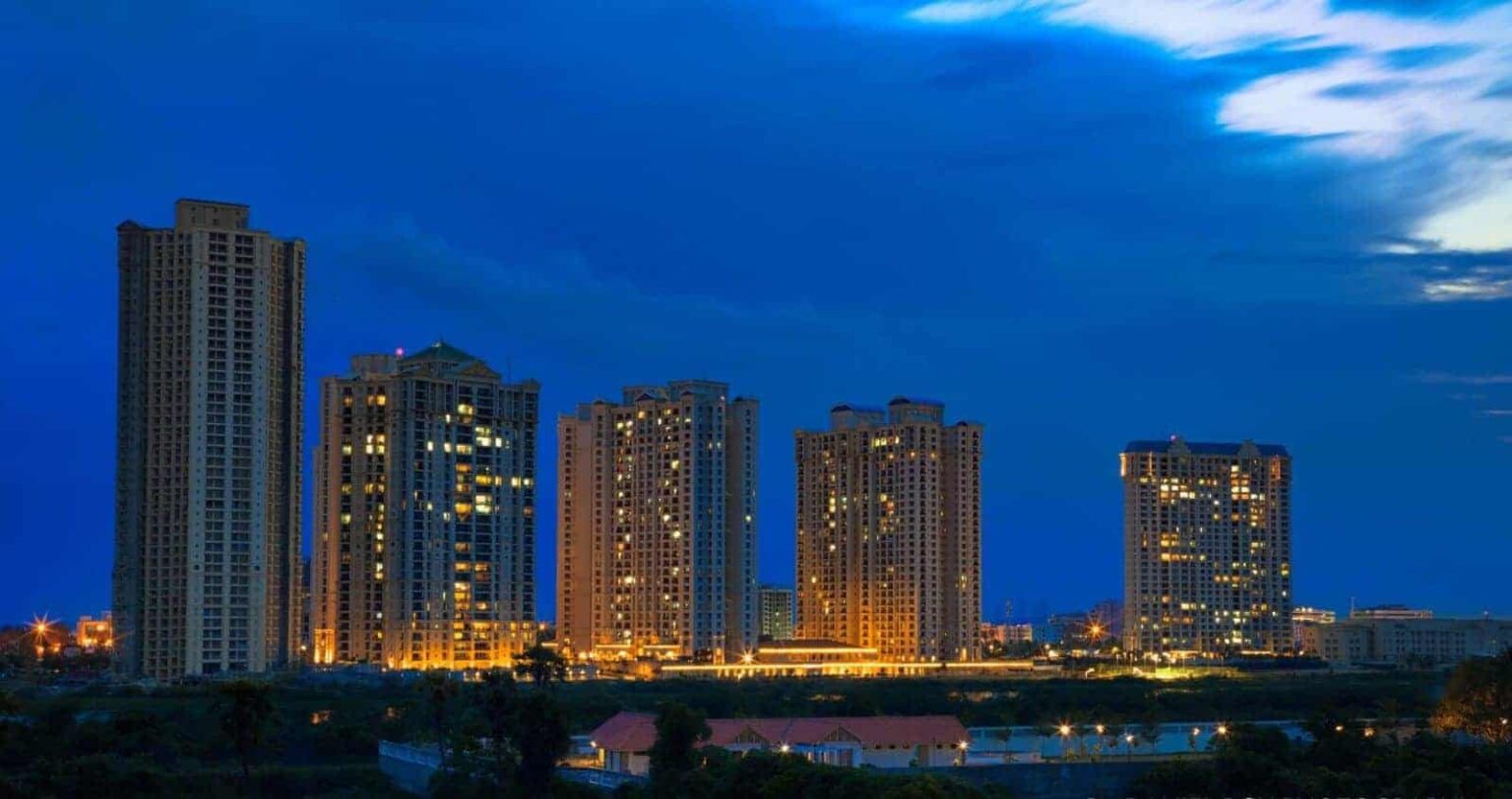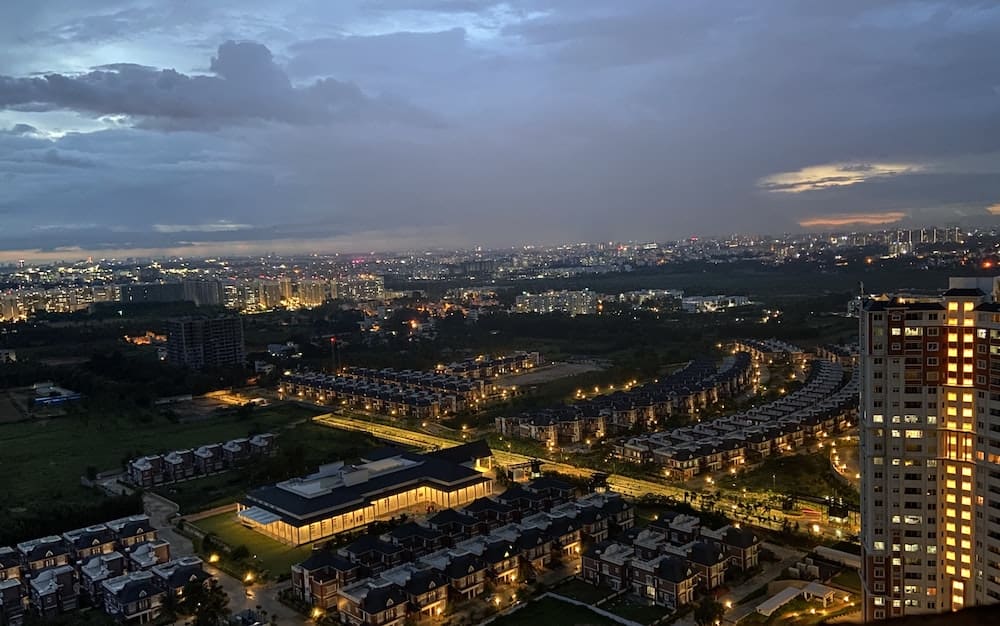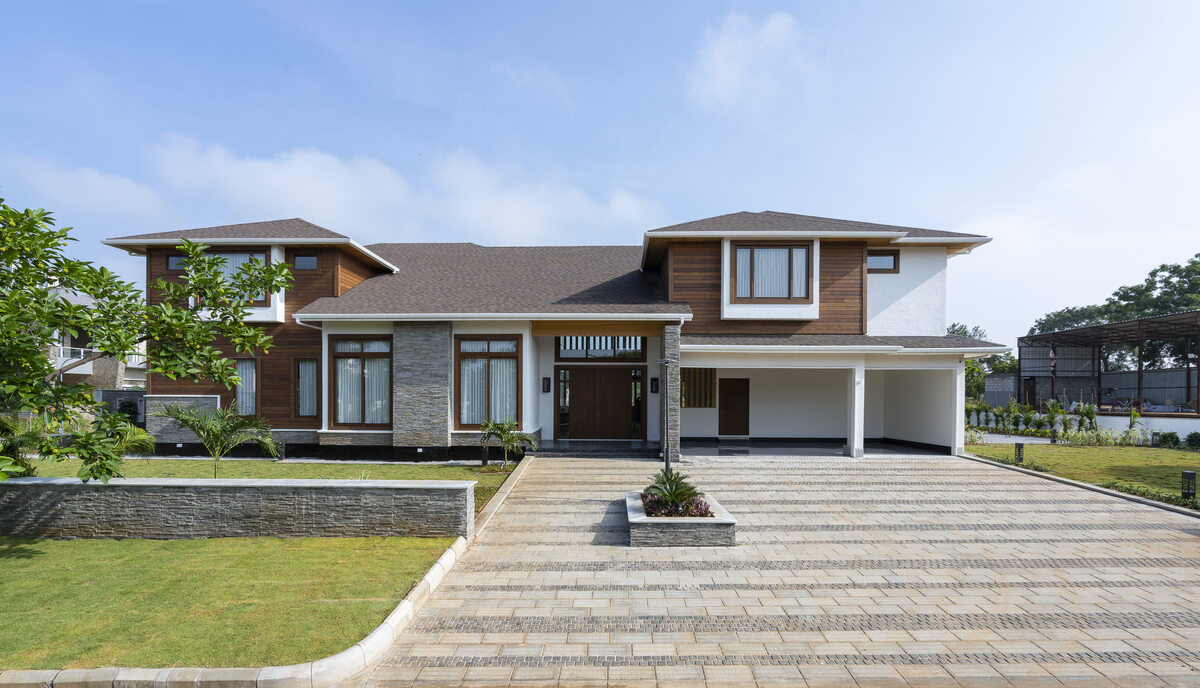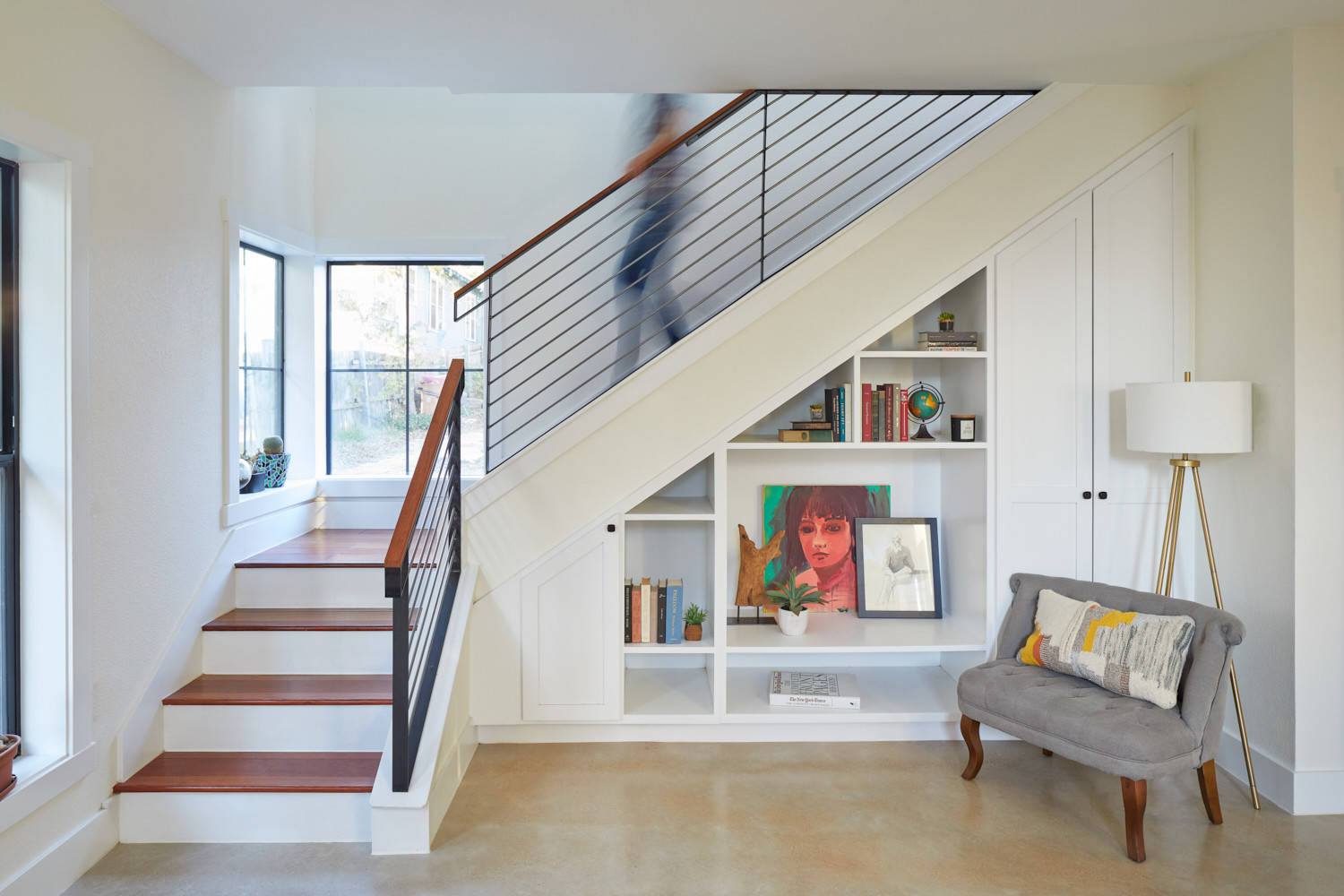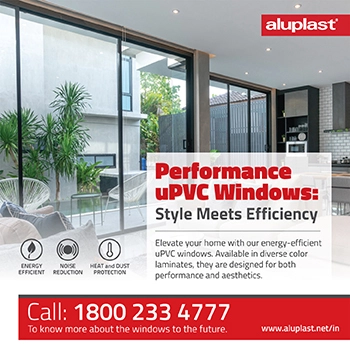The front elevation designs hold great importance in the architecture of a building as they not only make the building visually appealing but also add to its environmental and commercial value. The normal house front elevation designs involve careful and precise planning. The four sides of a building must be designed and constructed in a wholesome way to raise its overall value. However, a common trend among the masses is to focus only on the front elevation designs (facade). This article covers the front design of house images so that you can get inspired.
The best way for an architect or consultant to get into action is by studying the contexts of past house elevation design projects and using the experience to tailor appropriate home front elevation designs for the client. Furthermore, factors like the climate, prerequisites, location, etc. also factor in while planning the elevation designs for houses. A well-planned building elevation design provides sufficient sunlight, avoids excessive noises and flares, and maintains the building temperature while reducing energy consumption. Therefore, elevation designs of buildings require a comprehensive study and understanding of sustainable architecture and development.
Contents
What is a normal house front elevation design?
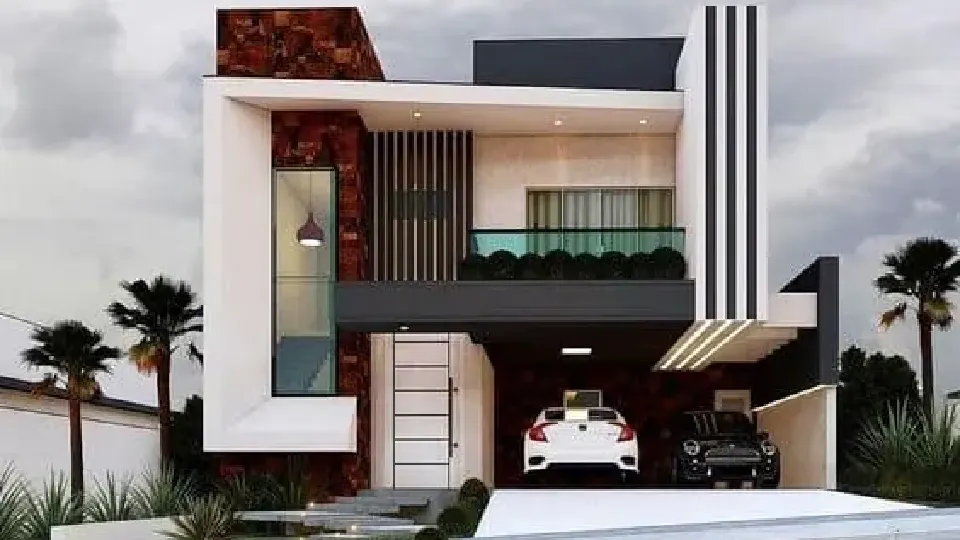
Image Source: roverebay.com
A normal house front elevation design is also known as access elevation. It is an architectural drawing that demonstrates how a house will appear from a specific angle. The main purpose of front elevation design is to create a visual appearance of the project that’s in progress.
Front elevation designs are crucial in accurately representing the building’s exterior features, such as the roof design, window placement, and exterior finishes. It also helps architects and builders identify any design flaws or necessary modifications before construction begins.
Front elevation designs for normal houses
By styles
Front design of house #1 – Jali design
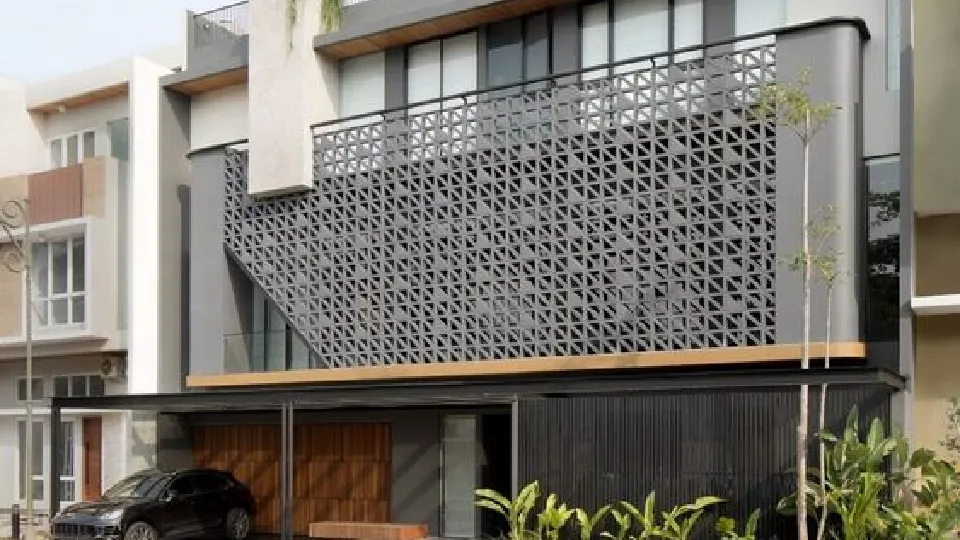
Image Source: pinterest.com
This unique building elevation design garners many eyes for its unique front elevation jali design. Such housing elevation designs also give the occupants an uninterrupted view of the outdoors. Moreover, the balcony remains distinctive in such elevation designs for houses.
| Also see: Nexion endless ventilated facade |
Front design of house #2 – Bungalow elevation
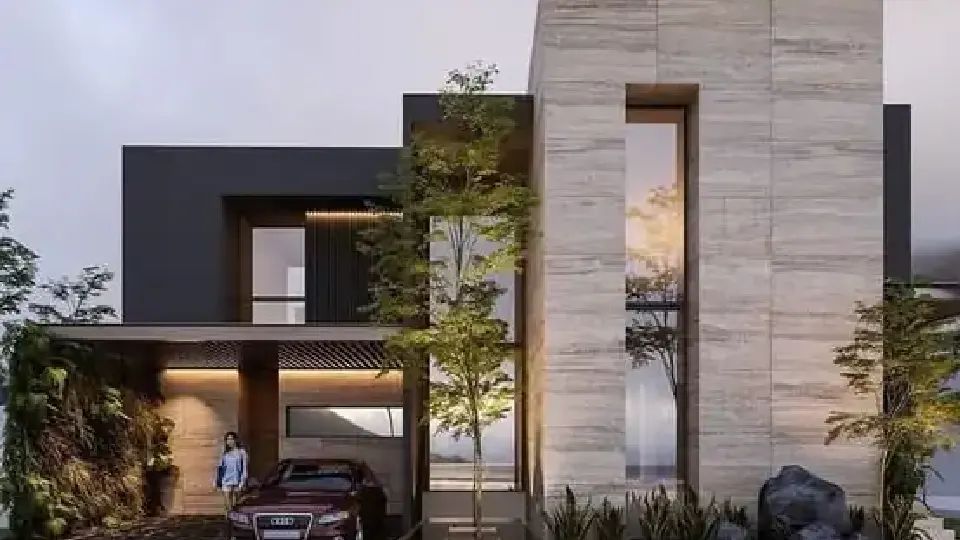
Image Source: twitter.com
This beautiful bungalow elevation design comprises many varied elements. The ample use of glass and front home elevation design tiles in this bungalow elevation design gives it a unique and rich look. Additionally, the use of light and dark shades in this bungalow elevation design makes it look grander.
Front design of house #3 – White coloured normal house front elevation design
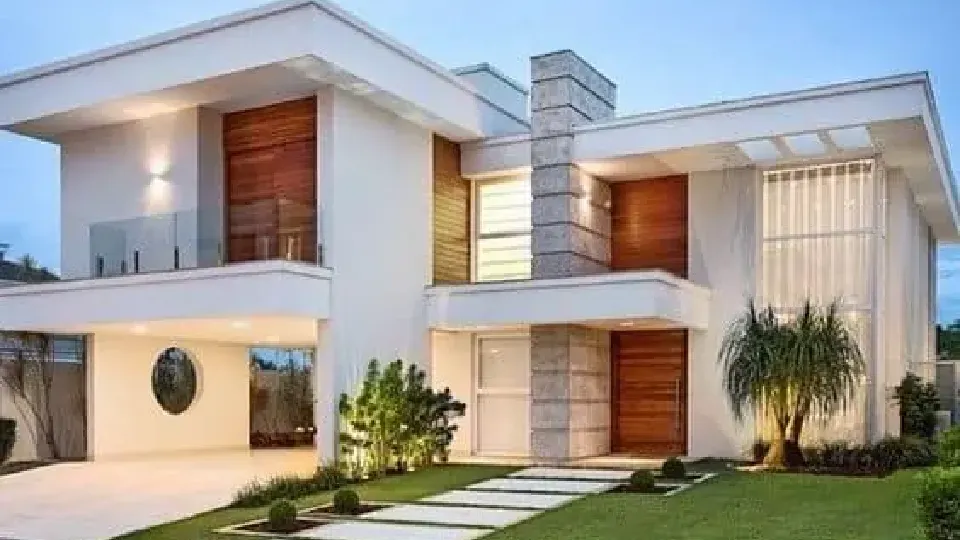
Image Source: wattpad.com
This front elevation design for a double-floor building uses white colour. Additionally, the use of wood gives it a more impactful overall appeal. The subtle use of grey in the front elevation design for the house makes it look lavish and posh.
| Also see: 25 head-turning Indian house colour combinations for outside walls |
Front design of house #4 – Designs for small normal houses
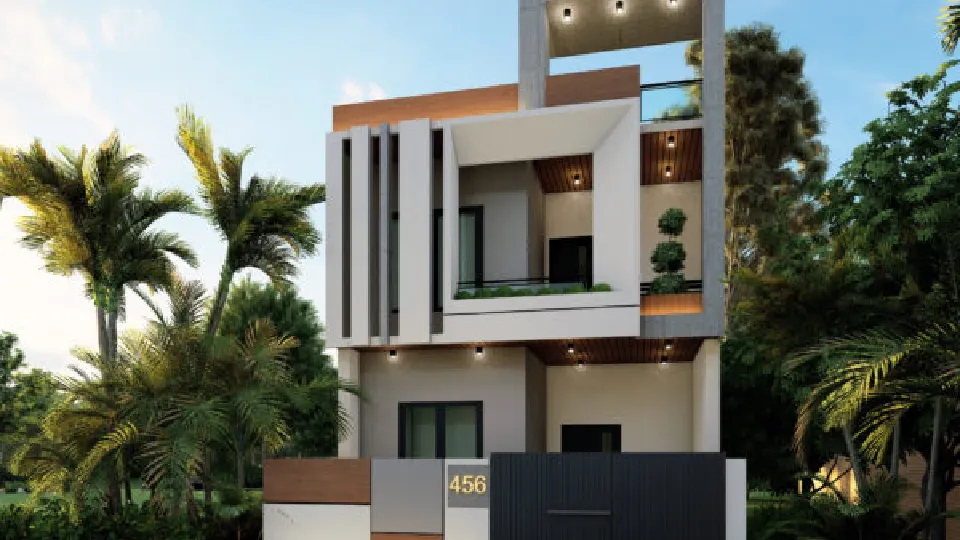
Image Source: pinterest.com
To plan the front elevation designs for small houses, you must ensure that they not only look aesthetic but also cater to the overall requirements of the building elevation designs. This front elevation design for a small house gives sufficient space for a balcony, windows, light, and ventilation entry. Furthermore, the use of diverse patterns and elevation design colours makes it look very distinctive.
Front design of house #5 – Single-floor elevation
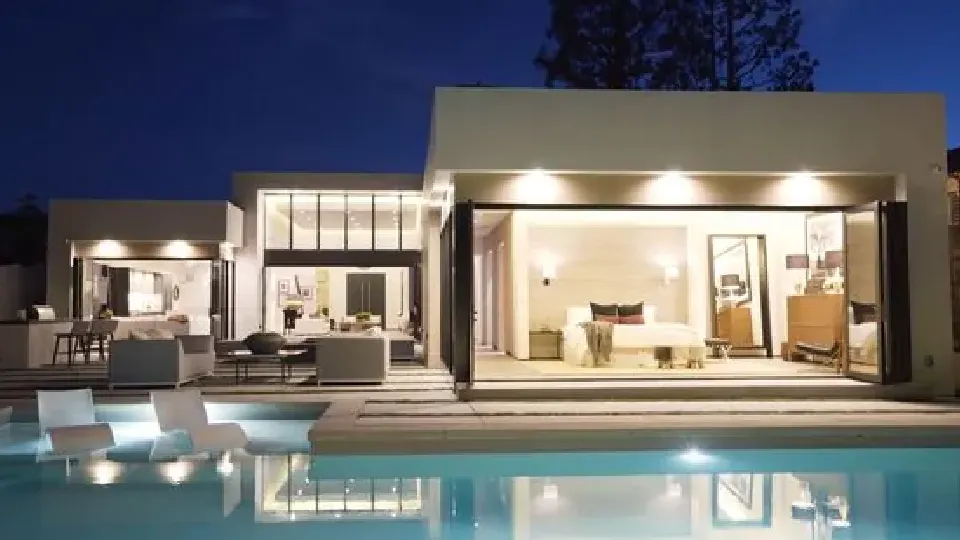
Image Source: gambrick.com
The single-floor elevation design must be inclusive of all elements of a house elevation design. Therefore, this unique elevation design encompasses glass walls for an unobstructed view. Furthermore, the vibrant lighting of the single-floor elevation design makes the house look perfect.
| Also see: 15 Single floor house designs for inspiration (+detailed floor plan) |
Front design of house #6 – Elevation designs for 2-floor building
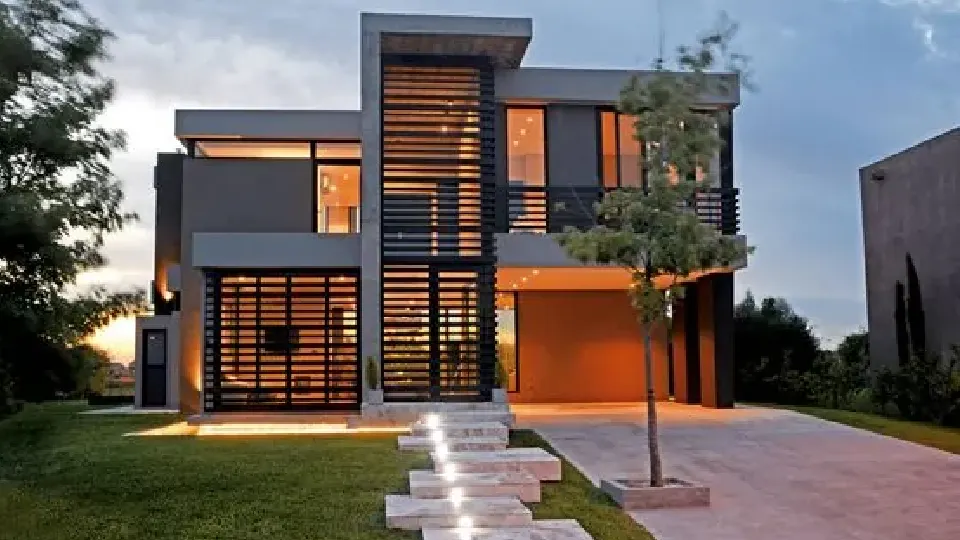
Image Source: portaldearquitectos.com
The beautiful elevation designs for a 2-floor building must cover all the aspects of architectural elements. In this elevation design for the 2-floor building, the house receives ample light and air. Furthermore, the artificial decorative lights in elevation designs for a 2-floor building make the house look bright and warm.
Front design of house #7 – Elevation designs for 3-floor building
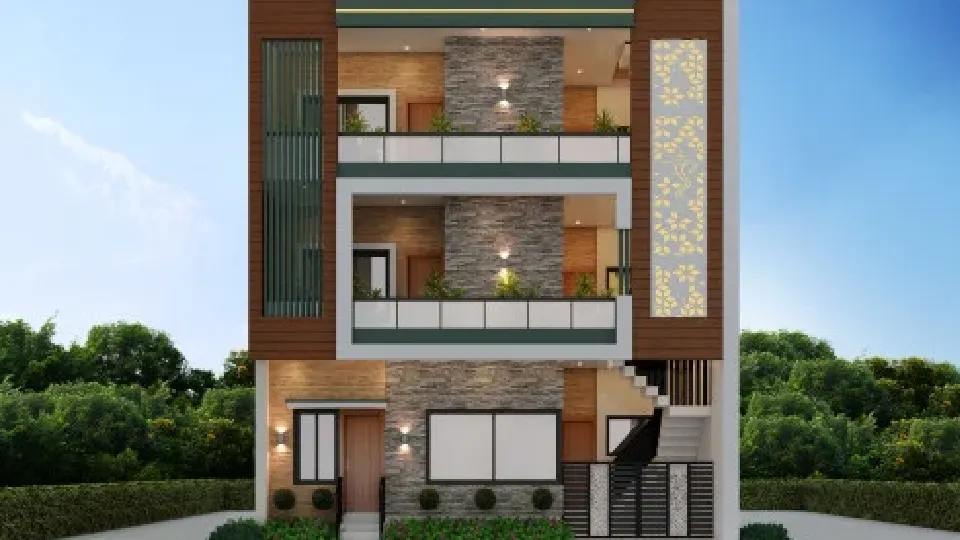
Image Source: makemyhouse.com
It becomes challenging for architects to plan excellent elevation designs for 3-floor buildings as many factors remain involved. The elevation design for a 3-floor building uses unity of design. Furthermore, the use of different elevation design colours gives each floor a unique and individualistic look.
| Also see: 56 Main door designs for modern Indian homes (+Buying options) |
Front design of house #8 – Normal house front elevation design
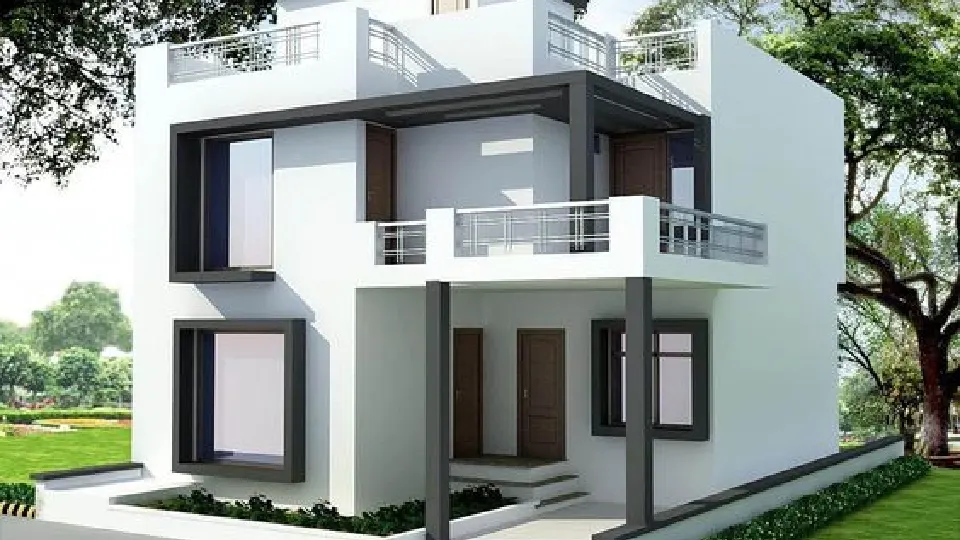
Image Source: indextap.com
The front house elevation design must give ample lighting and ventilation to the home. Especially, if it is open only from the front facade. This home-designing front elevation uses a jali design and different colour combinations. Therefore, it gives a unique look to the house.
Front design of house #9 – Modern elevation of the house
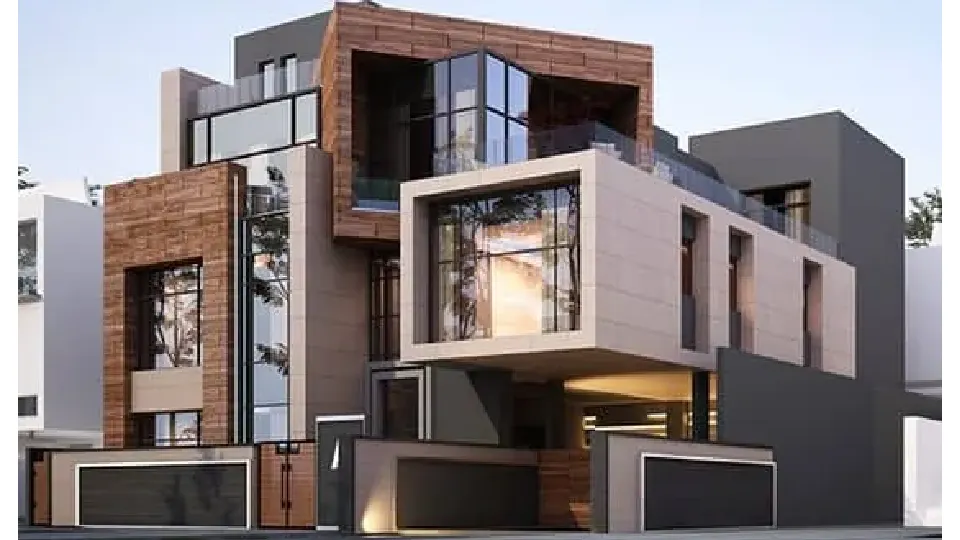
Image Source: behance.com
This modern elevation of the house uses different angles of geometric patterns. The extensive use of glass in this modern house elevation makes it unique and attractive. Furthermore, the wooden texture gives the modern house elevation a rich look. the use of multiple colour combinations in the front elevation of modern houses adds to the overall look.
| Also see: House design: 15 newfangled & futuristic ideas |
Front design of house #10 – Normal house front elevation design with glass
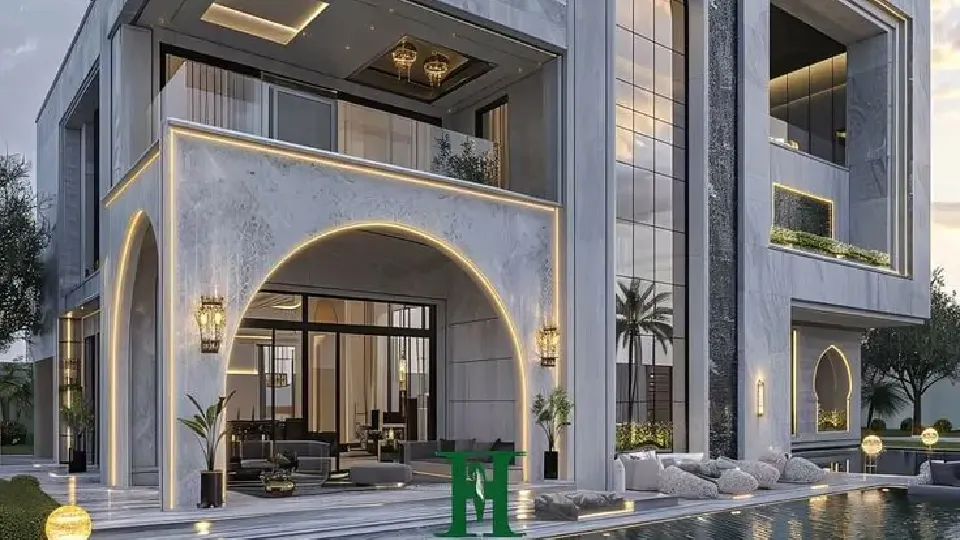
Image Source: futurestiles.com
The front elevation of the home should be spacious and give proper lighting to the house. This front elevation of the home design in glass uses various textures and colours. Moreover, the use of concrete texture in the modern home elevation design with glass makes it look classy and rustic at the same time.
| Also read: Expert’s guide to types of glass for construction and home interiors |
Front design of house #11 – Villa-style elevation designs
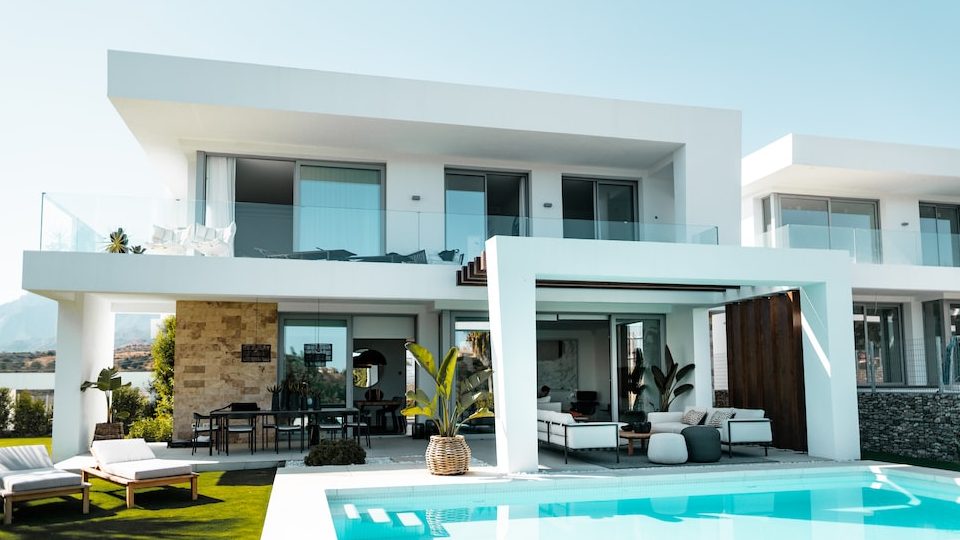
Image Source: unsplash.com
Many people dream of owning a villa; however, it requires a significant financial investment to make it come true. Having a perfect elevation plan ready in hand, before you make a final call will give you a good idea. Additionally, it can help you identify potential issues and make necessary adjustments to ensure a successful build. You can make informed decisions about including parking space, a patio, and a beautiful garden view.
| Also see: 18 Best farmhouses in India for a weekend getaway (with inspirational designs) |
Front design of house #12 – Kerala house elevation designs
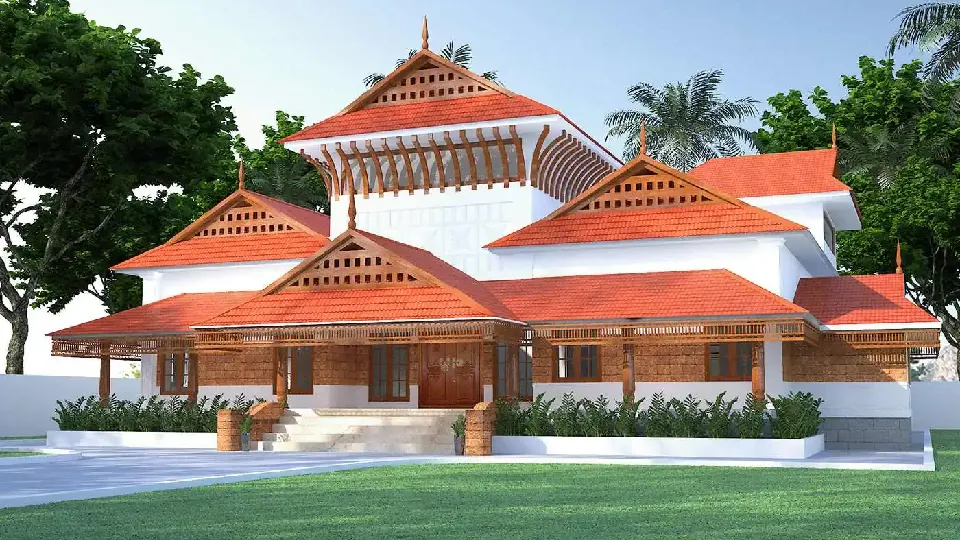
Image Source: behance.com
A Kerala-style house reflects rich traditional culture with heavy use of wooden elements and clay roof tiles. Despite their traditional style, Kerala house elevation designs look modern. Moreover, their sloping roof designs are constructed in such a way that they allow maximum natural light into the house. These houses are spacious, and well-ventilated and offer a comfy stay. Traditional architectural styles of Kerala house elevation design can suit regional weather conditions. Additionally, it can withstand extreme heat as well as rain.
Front design of house #13 – 3D elevation design
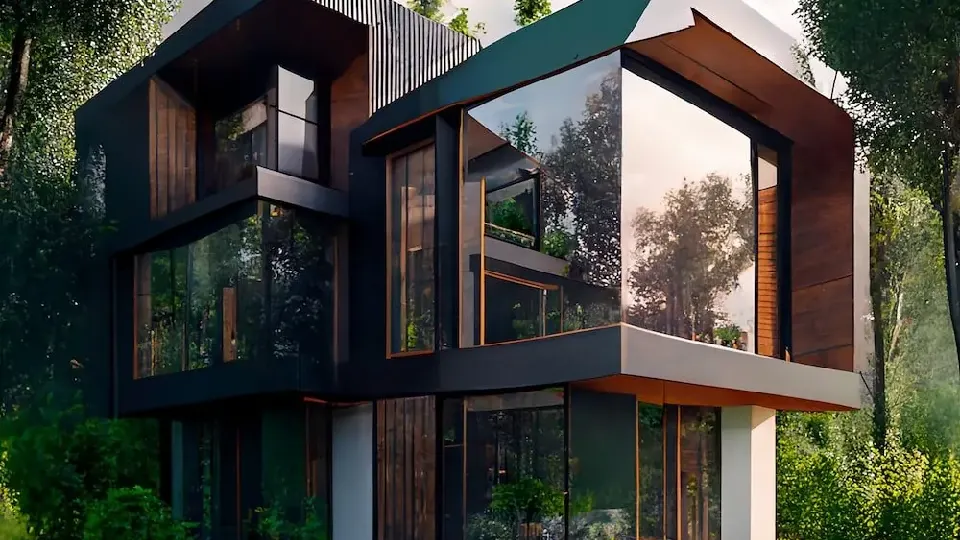
Image Source: unsplash.com
A 3D front elevation design is a perfect option for those who want to create an elevation of their line properties. The 3D model essentially clarifies how the building’s elevation relates to it. Since the elevation is prepared before construction, whatever changes you make to the 3D elevation design must be updated in the design plans as well.
| Also see: 21+ home designer software & tools you need to try now! (+FAQ) |
By materials
Front design of house #14 – Normal house front elevation design with tiles
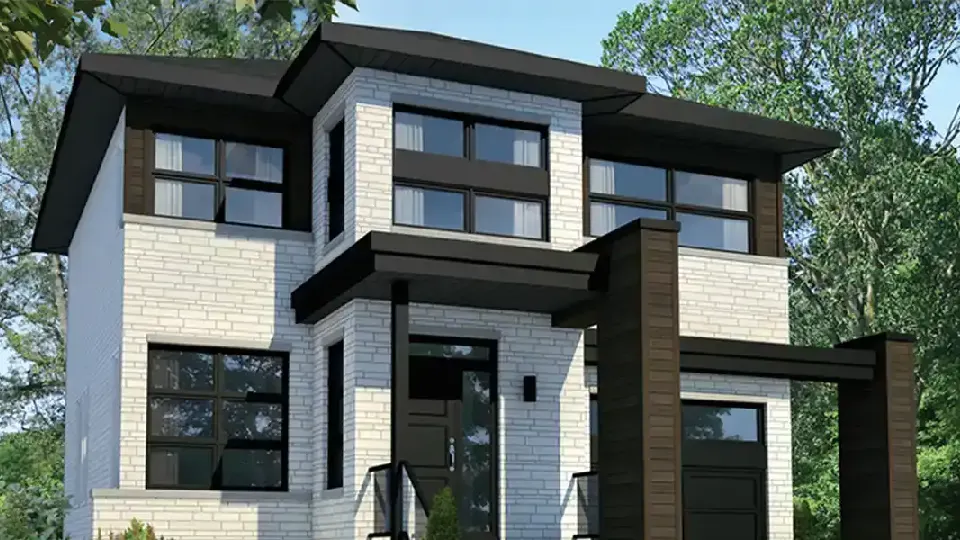
Image Source: alphasand.in
Tiles can be installed almost everywhere in your house. It is an ideal choice for residential as well as commercial projects. By installing tiles for the front wall or front elevation you can reduce the cost of changing wall paint frequently. You can also choose multi-coloured brick patterned or rock tiles as they are quite popular for home exteriors. Moreover, they lend an eye-catching and classy look to your house. Marble vitrified tiles, plain vitrified tiles, onyx vitrified tiles, statutario marble vitrified tiles, stone vitrified tiles, etc. are some of the best tiles for a normal house front elevation design.
Front design of house #15 – House front elevation design with bricks
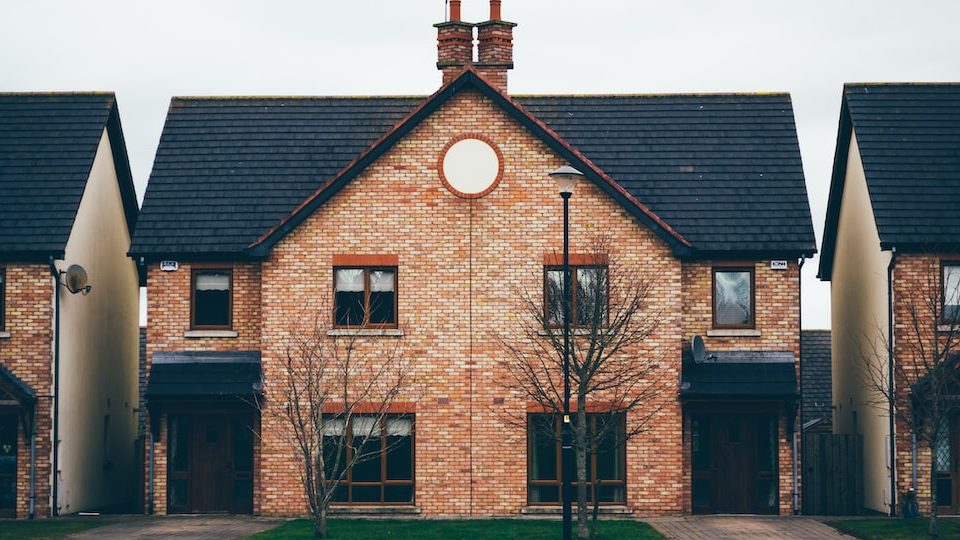
Image Source: unsplash.com
If you are looking for a low-cost normal house front elevation design, brick is a good choice. There are different styles and colours of bricks available on the market. However, brick in warm tones, similar to grey shades, with the addition of glass and concrete, reflects a contemporary facade design. You can fuse the bricks with a glass façade, which will give it a vintage appearance with a modern twist. This combination will not only enhance the curb appeal of your house but also provide good insulation and durability. Additionally, you can add some greenery to the front yard to make it more inviting and refreshing.
Front design of house #16 – House front elevation design with stone
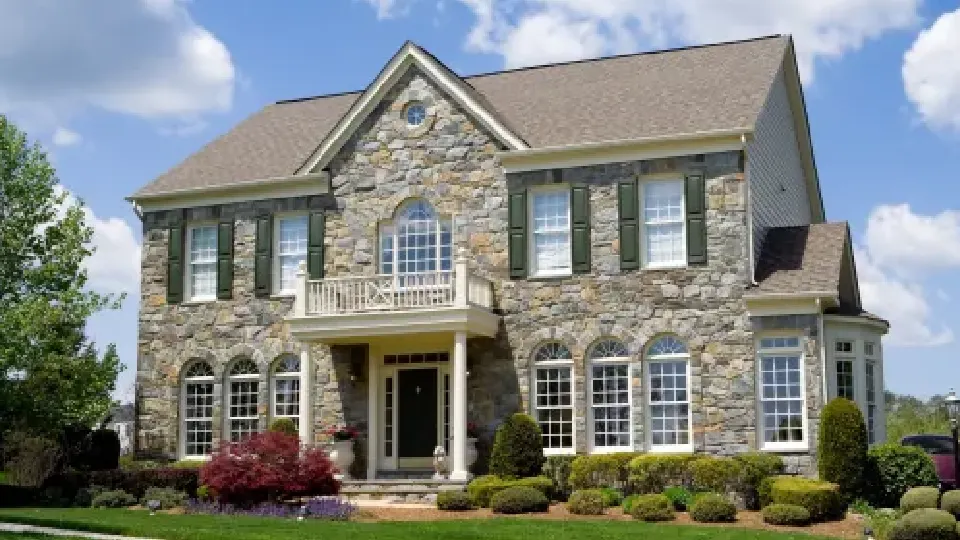
Image Source: istockphoto.com
Stone cladding is one of the best options for house front elevation design if you want a natural yet eye-catching look. There are a variety of design choices available, from classic grey to sandstone. Moreover, it will protect the exterior walls, thanks to the silicate and calcium materials present in it. This makes it a great option for buildings in areas with harsh weather conditions. Additionally, the design choices allow for customization to fit the aesthetic of any building.
Front design of house #17 – House front elevation design with wood
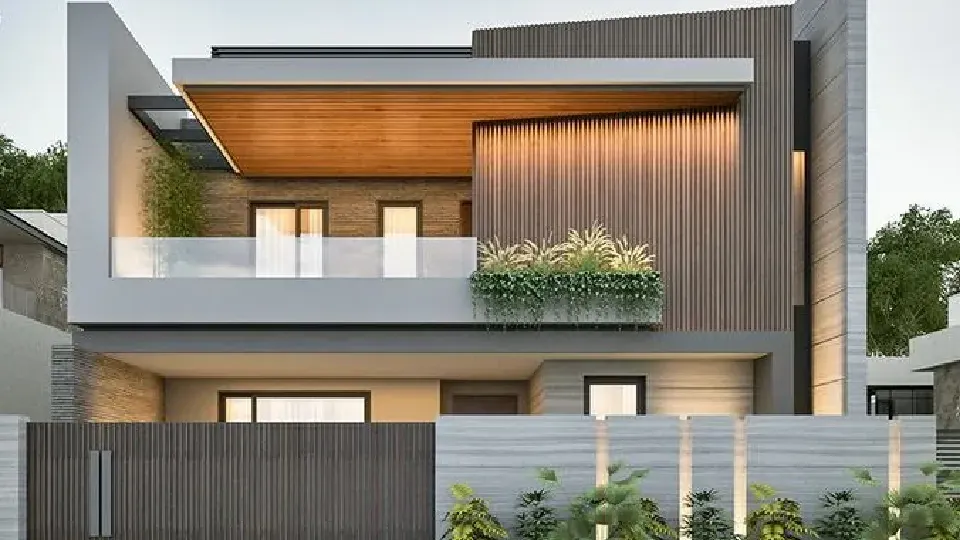
Image Source: pinterest.com
A house front elevation design with wood can provide a warm and inviting feel to the exterior of a home. Incorporating natural wood elements such as siding, trim, or accents can also add texture and depth to the overall design. Additionally, wood can be used in a variety of ways, from rustic to modern, to produce a distinctive and eye-catching facade.
Best colour combinations for normal house front elevation designs
Following are the top colour combinations for the front design of the house:
- Cream with maroon: Shades of red, especially maroon, are mostly preferred for brick walls. However, it’s advisable to split the front elevation design into two instead of turning it maroon completely. This will help to break the monotony and add a touch of contrast to the overall look. Additionally, incorporating other colours like beige or white can also enhance the aesthetic appeal of the building. Since cream goes well with dark colours, especially maroon, you can paint the upper half maroon and the lower half cream.
- White with charcoal grey: If you want a contemporary front elevation design, picking a perfect blend of grey and white is great. This colour combination gives a modern and sophisticated look to the building. Additionally, incorporating glass elements can further enhance the overall aesthetic appeal of the front elevation design.
- White with yellow: The yellow and white colour combination is a classic choice for a house front elevation. It makes your house exterior appear welcoming and soothing to the eyes. When it comes to deep yellow shades, they are perfect for making a bold statement. On the other hand, subtle shades of yellow can add a touch of warmth and brightness to your outfit without being too overwhelming.
- Dark blue & bluish-white: This inspiring colour combination can give your home a modern and sophisticated appearance. It also creates an eye-catching contrast that can help the house stand out in the neighbourhood. To add a modern touch, choose a bluish-white elevation tile design with a matte finish for the walls. By painting the roof dark blue, you can create a cohesive and stylish look for the building’s exterior. This will look great with the darker accents on the roof and windows.
Things to consider for good normal house front elevation designs
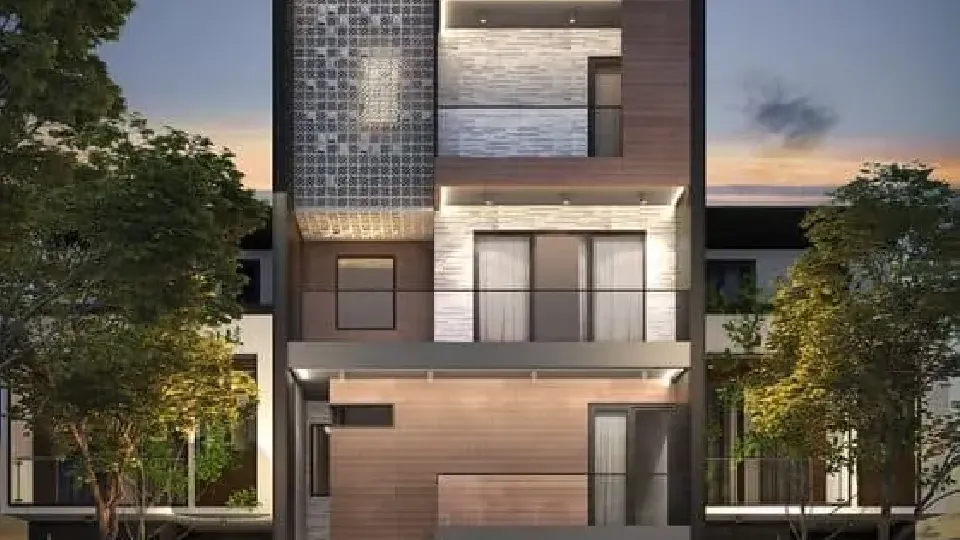
Image Source: behance.com
There are two types of projects that an architect comes across. Some buildings are designed to be iconic. Therefore, in these buildings, the elevation designs building come out from the overall structure and form of the building. Then other buildings are mainly dependent on their front elevation designs for their aesthetic appeal. Both projects require a unique and varied front elevation design approach. While the designers, consultants, and architects constantly look for modern, innovative, and fresh commercial and housing elevation design ideas, they must not compromise with the basic rules and conditions of designing and construction.
Harmony between all the elements of building elevation designs
The architect must ensure to maintain harmony between all the elements of the building elevation designs. Moreover, having unity will make the components of the front elevation designs seem one and whole instead of parts. So, the ways to achieve this unity are:
- Use a specific element and follow the method of repetition throughout the office or housing elevation designs to form a pattern.
- Follow the method of continuity of line, literally and/or visually. Architects can also follow the continuity of a grid or any other pattern.
Keep in view the drainage and water issues while planning the elevation designs for the house
Well-planned elevation designs for houses give proper thought to water-related issues. Moreover, the entry of rainwater inside the building remains a common problem experienced in most of the poorly-designed buildings. Therefore, to overcome that, the normal house front elevation designs should be prepared with deep insight and precision.
Some tips to avoid this hindrance are:
- Installation of the retractable awning at the front elevation designs for small houses.
- Installation of outdoor blinds in the form of PVC sheets, mesh fabric blinds, etc.
- Installation of bamboo chick blinds at the front elevation designs for the house.
Allow natural light to come in through the housing elevation designs
To cut down the maintenance cost, in the long run, the most convenient way is to plan the front elevation designs in such a manner that it allows the entry of natural light. Moreover, it cuts down the energy cost by at least 30%; thus, contributing to a greener environment.
Bring variety to your normal house front elevation designs
Do not forget to add variety to the architectural elevation in an attempt to unify it. Follow the mantra of ‘variety within unity.’ Monotonous is boring. Hence, follow these basics and make your building elevation plan stand out:
- Maintain unity in geometry by using the same shapes throughout the front elevation designs for the house, but use different colours and sizes.
- Unify the colour, but change the shapes of the elements of the front elevation designs of your home.
- Use the same elements of the elevation design building of the same shape and size at the base and keep modifying it per unit by stretching, tilting, folding, or twisting it.
Create a focal point in your home elevation designs
The front elevation design building should be such that the emphasis is given to the entrance and other major parts of the building. Therefore, the gate design should be such that it complements the normal house front elevation designs.
Here are some tips:
- Emphasis by contrast: Create a contrast by using specific colours, textures, and shapes.
- Emphasis by isolation: Isolate one element from its successive pattern and make it the focal point.
- Emphasis on placement: Placing the gate at the centre of the front elevation designs for the house would naturally draw the focus towards it.
- Emphasis by distinction and massiveness: A massive element attracts the eye and becomes the focal point. Similarly, a distinctive element also draws attention and focus.
Follow the ancient Greek rule of proportions
They are the deal-makers or breakers. The most popularly used proportions in architectural elevation designs of buildings are:
- Golden Ratio: The Golden Ratio describes the naturally present perfectly symmetrical relationship between two proportions. Since ancient times, architects have been using the Golden Ratio to find the exact proportion of height and width of a building. Even today, this concept is widely used and accepted. The value of the Golden Ratio is 1.618. The use of this Ratio brings about an artistic balance in the building elevation designs.
- The Modulor given by Le Corbusier: Le Corbusier is one of the greatest architects of all time. He gave the concept of Modulor measurement in his book ‘The Modular’. This sequence helps achieve harmony in architectural compositions. Le Corbusier was convinced, and rightly so, that this concept would allow the designing and construction of aesthetic and spacious buildings.
Have a balance in your building elevation designs
Another essential factor that must be present in well-designed building elevation designs is balance. The basic way to achieve it is by symmetry. It has been followed since ancient times. However, it is not in trend anymore. The indirect approach to get the balance that is devised by contemporary architects are:
- One can achieve asymmetrical balance by playing with the colour saturation and size of the elements. For instance, a large element with heavy colour saturation can be balanced with a smaller object with light colour saturation.
- A large and simple shape can be balanced with a small and complicated shape.
- A ‘crystallographic balance’ can also be achieved by giving all the units the same weight and not necessarily making them identical.
Develop a rhythm for an appealing architectural normal house front elevation designs
Rhythm can be achieved by patterns and repetition. Moreover, there are several ways to induce rhythm in front elevation designs for houses such as:
- Repeat the same pattern several times in a rhythmic style to give the front elevation designs a holistic look.
- You can also follow alternate repetitions in small house front elevation designs and give them a modern tone.
Use contrasts to make the normal house front elevation designs interesting
To relieve boredom in the elevation designs for houses, the use of contrasts should be made. However, it must be ascertained that the contrast does not mess with the overall balance of the house elevation designs.
The safest ways to use contrast are:
- Solid and void
- Opaque and transparent
- Smooth texture and rough texture
- Light and dark
Factors that influence normal house front elevation designs
The following are the factors that can affect the front design of the house:
- Plot size: The front elevation designs can be influenced by the plot size and any regulation setback considerations. If you have a large plot, it will allow more experimentation. On the other hand, smaller plots can make an experiment difficult. However, you can counterfeit that with a little more effort.
- Floor layout: One of the most important aspects that can impact the appearance of your front elevation design is the floor plan. The floor plan is one of the most critical aspects that influence the appearance of your front design. You can choose any window frame size if your front-facing floor plan includes communal areas such as a living room and lounges. However, it is critical to keep privacy and structural considerations in mind. Avoid installing a toilet in front of your house because it may affect the architecture.
- Geographical location: Another factor that can influence the front elevation design is the geographical location of a building. For instance, buildings located in areas with high precipitation may require sloping roofs to prevent water accumulation. Similarly, buildings in areas prone to earthquakes may require additional structural support to withstand seismic activity.
Types of normal house front elevation designs
The four types of normal house front elevation designs are:
- Front: The front elevation is the exterior part of a building or house, which has the entrance door, front porch, and windows.
- Rear: The rear elevation design helps you see the outdoor spaces behind the house, like gardens and parking areas.
- Side: A wall that cannot be regarded as a front or rear wall produces side elevation. It shows the structure’s depth and other characteristics.
- Split: The elevation where the property’s floor levels are uneven is known as the split elevation. Split-level buildings have multiple levels connected by short ramps or stairs.
Watch this video: 100 Contemporary front elevation Designs for small to large houses (7 mins 41 secs)
Changing trends in modern elevation designing
Good elevation design homes must not just be aesthetic but also offer protection and sustainability. It must act as a shield from harsh weather conditions and also provide a breathable environment inside the building. Therefore, the building materials should be energy-efficient, innovative, adaptable, and robust to meet all the requirements. More than 40% of the world’s energy is consumed by buildings. Hence, today, the conception of sustainable building is more imperative than ever. Moreover, green building materials must be incorporated into building projects to reduce the environmental hazards that are associated with the transport, extraction, processing, installation, fabrication, reuse, recycling, and disposal of building materials.
With the emergence of new technologies and materials, and also the evolving and considerate perspective of people, the elevation designing market has grown exponentially. In addition to that, a new range of materials has emerged. Materials like high-pressure laminates (HPL), carbon fibre, ultra-high performing concrete (UHPC), ETFE membranes, solid surfaces, and corten steel are available. Thanks to the rapid technological advances over the years!
New-age products for building and home elevation designs
DuPont Corian Exterior Cladding Material for normal house front elevation design
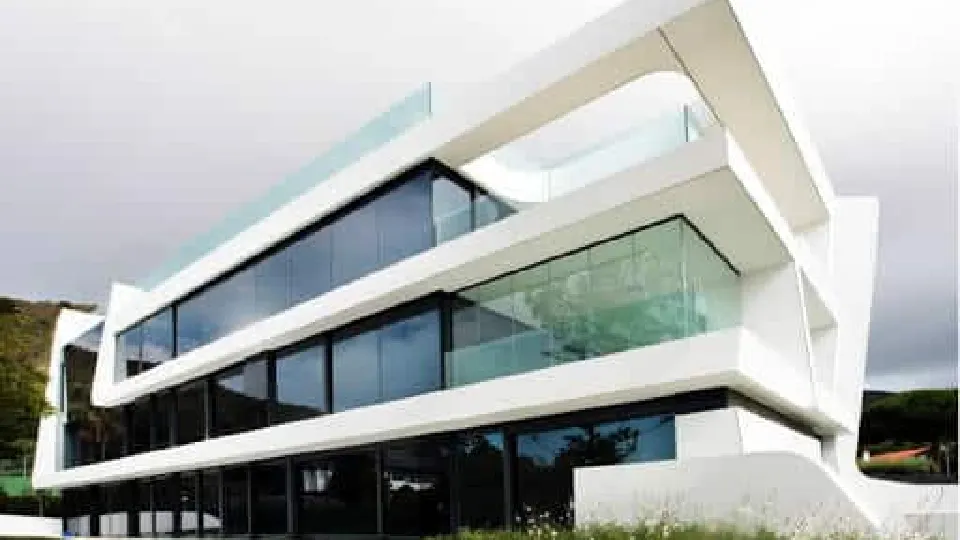
Image Source: designcurial.com
DuPont manufactures extremely innovative facade systems. In addition to that, their beauty, depth, and normal house front elevation design colours come in many choices. Moreover, the strength, purity, and performance of DuPont home elevation design materials remain worth mentioning. The Corian exterior cladding material by DuPont offers amazing fire, structural, weather, and environment-friendly performances. The durability and renewability of this building and home elevation design material remain paramount.
HIL Ltd. Aerocon for normal house front elevation design
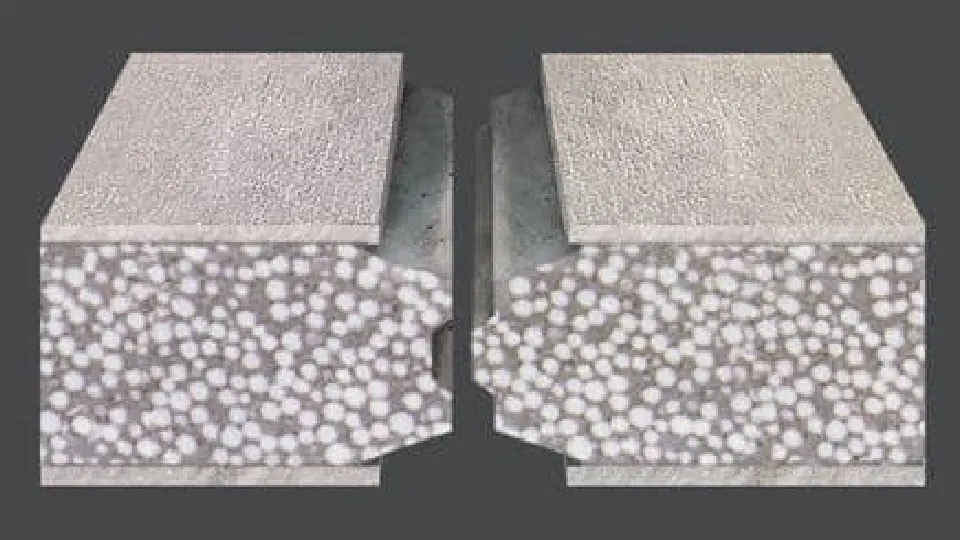
Image Source: hil.in
Aerocon Sandwich panels from HIL Ltd. are pre-cured, lightweight, high-performance, ready-to-install, drywall solutions. They offer outstanding resistance to moisture, fire, termites, and corrosion. They are great thermal insulators. Thus, they save up to 15% of the energy cost. These panels are strong enough to hold a heavy load. Aerocon AAC blocks are a superior alternative to concrete block bricks and clay bricks. They have excellent acoustic and thermal insulating properties and also save about 35% of the total construction time. They have great strength and are easy to cut and chisel.
FunderMax Max Exterior Range for normal house front elevation design
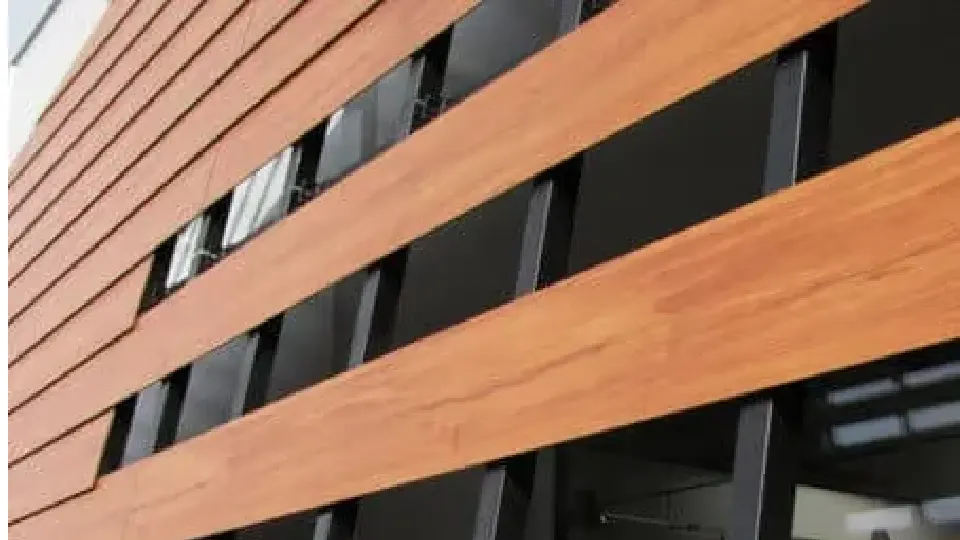
Image Source: fundermax.com
FunderMax has brought a revolution in the exterior and interior architectural materials industry. It deals in wood processing and provides high-pressure laminates (HPL). FunderMax uses the latest technologies in house elevation designs. Adhering to their norms of sustainable construction, more than 60% of their panels use natural fibre. They are also free of organic halogen compounds that are usually found in PVC sheets and greenhouse gases. They do not have asbestos, sulphur, cadmium, mercury, and other wood protection agents.
CenturyPly Zykron for normal house front elevation design
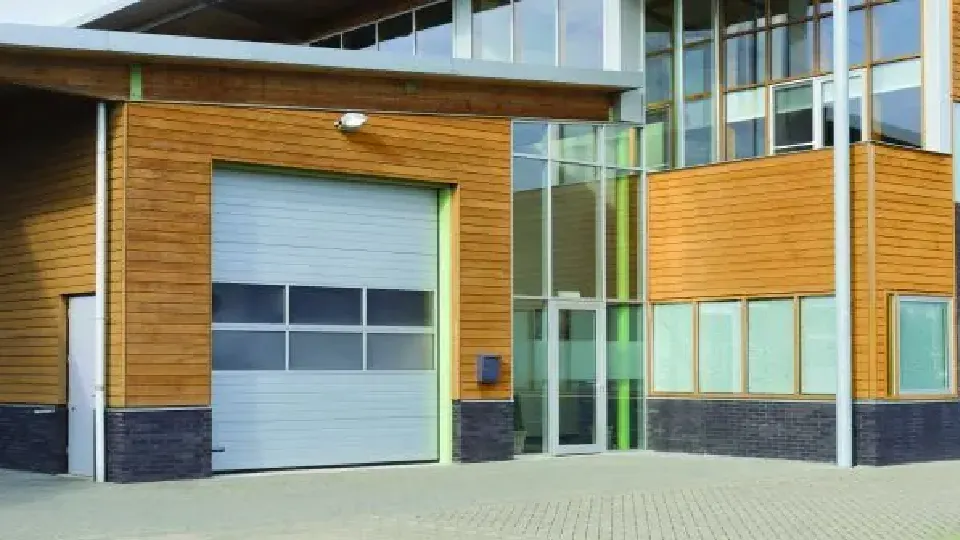
Image Source: centuryply.com
Currently, the elevation designs of Indian buildings remain dominated by ACP or glass. ACP is very expensive and increases the overall cost of front-elevation architecture. Also, the elevation design colour fades after some time. Moreover, glass does not prove to be of any help with energy efficiency. CenturyPly Zykron-Siding, on the other hand, is a fibre cement product. It is manufactured in an eco-friendly manner. Moreover, it has good thermal resistance and acoustic properties. It keeps the building cool. Additionally, it the fire-resistant, insect and termite-resistant, immune to water damage properties that add to the aesthetic of the building, and has low shrinkage and warping.
Alstone WPC Panels for normal house front elevation design
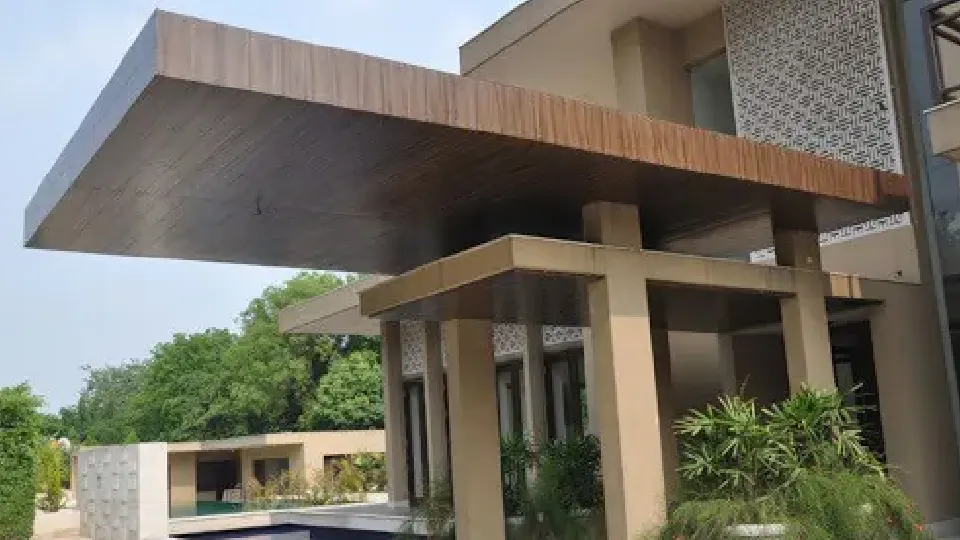
Image Source: alstoneindia.com
WPC Panels or Wood Polymer Composites by Alstone give your front elevations of houses a natural, effortless look. Therefore, these panels can give the housing elevation designs an undifferentiating look that is both contemporary and futuristic. The WPC Panels can be processed like solid wood and natural wood. As a result, they are one of the best products to be used as an exterior-grade material. They have high impact and tensile strength. These panels support sustainable development. They do not contain any toxins. The WPC Panels lie in the EO class which is rated environmental-friendly and can be recycled.
Saint Gobain Vinyl Sidings for normal house front elevation design
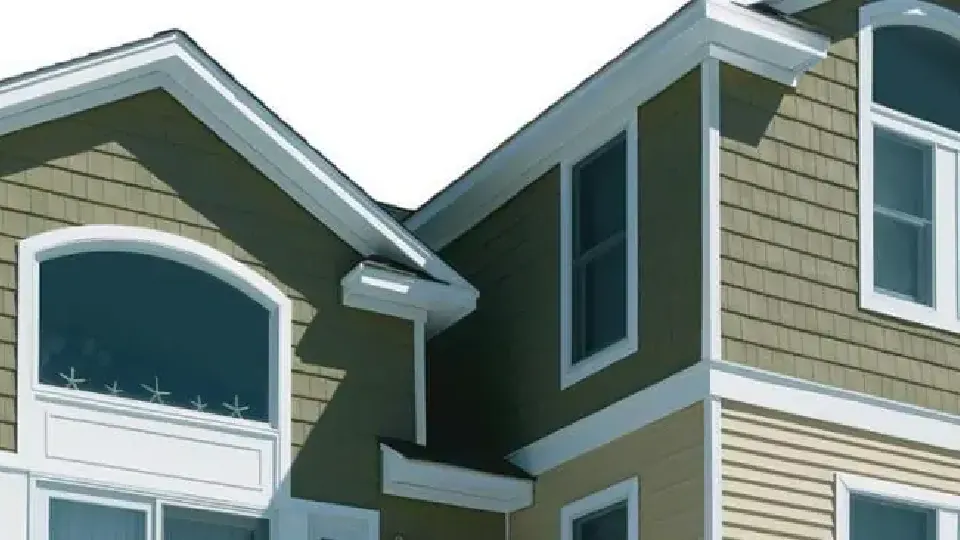
Image Source: saintgobain.com
Saint Gobain Vinyl Sidings mainly blend with PVC extrusion sheets during their manufacturing with pigments, acrylic agents, and stabilizers. Furthermore, the finished product has better elevation design colour stability, durability, and UV resistance than the mainstream PVC sheets. These sidings have almost zero-maintenance properties and a simplistic style. Vinyl sidings have great sustainability. Moreover, they can be applied on any plain wall of at least 16 mm thickness easily. Additionally, they are resistant to environmental degradation, energy-efficient, and durable.
Canadian Wood Timber Cladding for normal house front elevation design
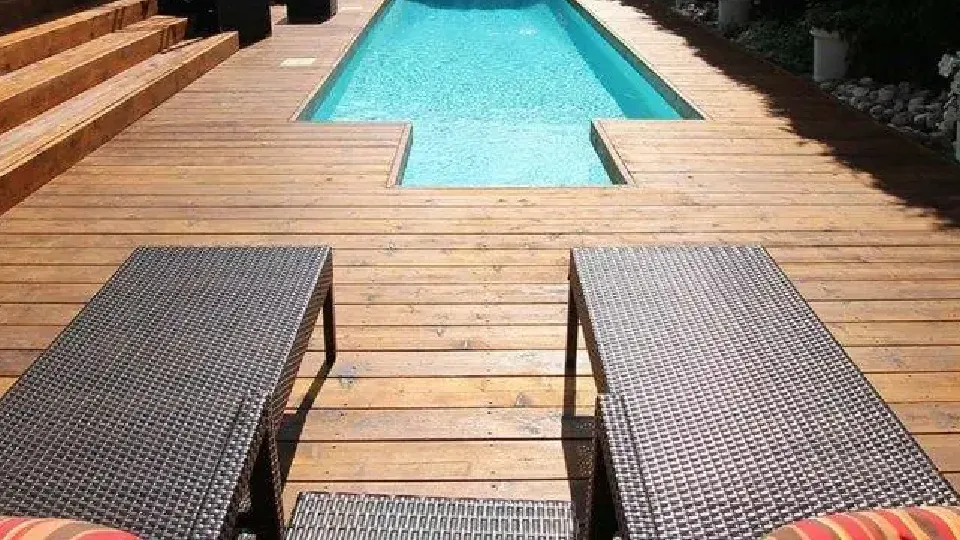
Image Source: canadianwood.in
A conventional yet sustainable way of designing a captivating front elevation is the use of timber wood. It is gaining recognition globally because of its plethora of benefits. Moreover, the Canadian western red cedar traded by Canadian Wood is one of the most favoured species of timber wood. In addition to that, it is termite, insect, and rot-resistant. Moreover, it has a great aesthetic appeal. It is economical and does not decay. Additionally, it is also energy-efficient, credited to its insulating properties.
Everest Stone Cladding for normal house front elevation design
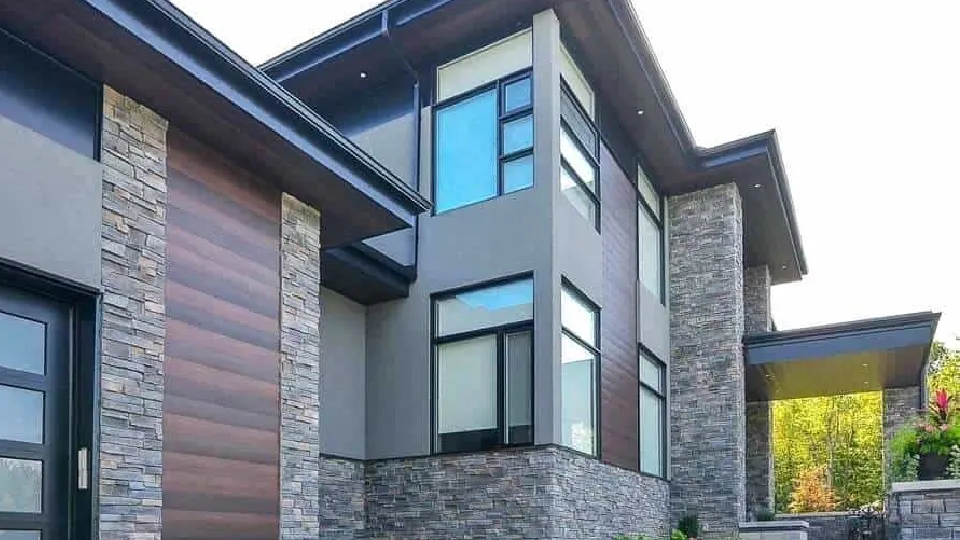
Image Source: everest.com
The most economical elevation design building materials are Everest stone cladding. You can apply them to both steel and concrete buildings. Stones are naturally found substances. Therefore, they do not lead to any environmental degradation. Stone cladding is a thin, refined layer of stones. Hence, it is not as heavy as the latter; thus, reducing the overall weight of the building.
House front elevation design images
-
1. house front elevation design images
-
2. elevation designs photos
-
3. beautiful front design of house images
-
4. elevation design images
-
5. front design of house images
-
6. unique elevation design images
-
7. house front elevation design images
-
8. elevation designs photos
-
9. black elevation design images
-
10. house front elevation design images
-
11. elevation designs photos
-
12. beautiful elevation design images
-
13. house front elevation design images
-
14. elevation designs photos
-
15. house front elevation design images
-
16. front design of house image
-
17. elevation designs photo
-
18. front design of house image
-
19. front elevation design images
-
20. front design of house images
-
21. all white house design
-
22. front house design
-
23. glass and wood facade
-
24. Stones & marble for unique facade
-
25. facade design with a basement space
-
26. Luxury house front designing
-
27. Dark-coloured building elevation
-
28. Bright facade design
-
29. Slop-roof front elevation of house
-
30. luxury in white facade design
Sustainable building elevation materials and green technology have become a cool trend and a niche. End-users remain inclined towards them for the home designing front due to several reasons such as making a social statement and protecting the environment. Moreover, architects, building consultants, and contractors agree that a shift towards green and sustainable development remains inevitable and evident. Also, for the best building elevation designs & front home designs, parameters like fade resistance, adaptability to geographical conditions, longevity, and sustainability have become the major deciding factors, and rightly so.
An understanding of the basics of commercial and residential elevation designs including all big and normal house front elevation designs makes it easier for professionals to make the right decisions and plans. In addition to different types of normal house front elevation designs and other building elevation designs, this article will help you decide on a more wholesome and proper approach for your office and home elevation design project.
FAQs
What is the best material for a normal house front elevation design?
There are several materials available for a normal house front elevation design. Some of the most popular materials include brick, stone, stucco, metal, concrete, and wood. Furthermore, each of these materials has its unique characteristics and the best choice for your home will depend on your personal preferences, budget, and the overall style of your home. Ultimately, it’s important to choose a material that not only looks great but also provides durability and long-lasting performance.
Which tiles are best for house front elevation design?
Porcelain and ceramic tiles are popular choices for their durability and water-resistant properties. Additionally, natural stone tiles like slate, granite, and marble can give a unique and sophisticated look to the front elevation design. Also, marble vitrified tiles, plain vitrified tiles, onyx vitrified tiles, statutario marble vitrified tiles, stone vitrified tiles, etc. are some of the best tiles for house front elevation design.
Which colour is best for elevation?
Some popular colours for front elevations are neutral shades like white, beige, and grey, as they offer a timeless and elegant look. Bright colours like red, blue, and yellow are also gaining popularity, particularly for modern-style homes. Ultimately, the best colour choice for a house front elevation design is one that complements the style and enhances the overall appeal of the home. In addition, off-white, cream, and beige are some Vastu-approved colours for elevation.
What is 3D front elevation?
A 3D front elevation is a visual representation of the exterior facade of a building or structure, created using computer software or hand-drawn techniques. It provides a realistic and detailed view of the building’s design, including its height, shape, and features.
Which software is used to design house elevation?
There are several software options available for designing house elevations, including SketchUp, AutoCAD, and Chief Architect. Each of these programs offers different features and capabilities to suit various design needs.
*The featured image used in this article is from Teamaurus.com
A house becomes a home when it radiates the right kind of energy. Vastu Shastra helps you to attain this energy in your houseVastu Shastra: Design principles & tips to invite positivity in home





























